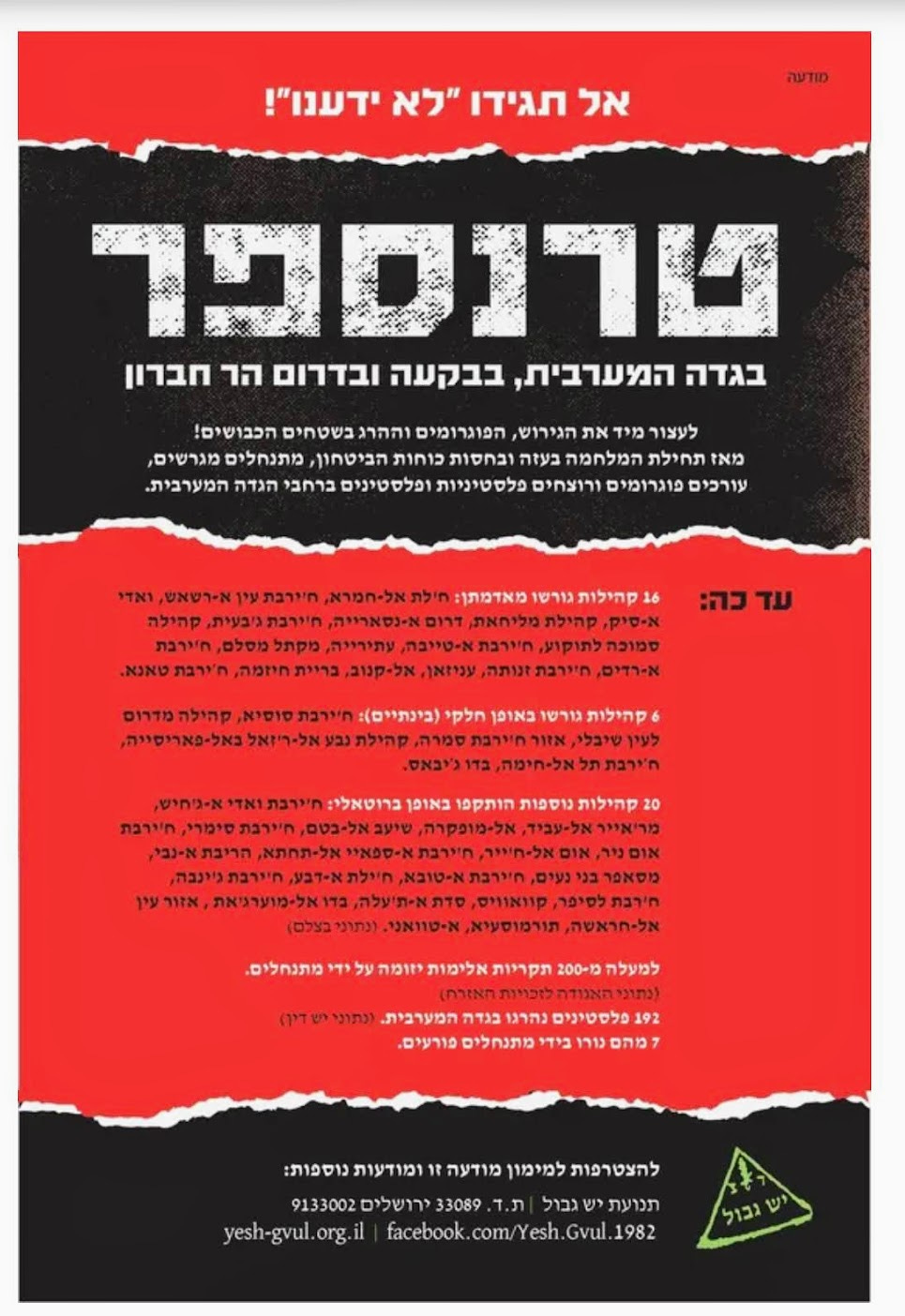Jewish Unity Was Fun While It Lasted
I was perusing the front pages of the Jerusalem Post and Hebrew Ha'aretz on the same day last week and couldn't help but notice the bipolar nature of their advertising. See the ads below.
This ad, by the left wing group "Yesh Gvul" ("There is a Limit") calls out the right's designs to "Transfer" Palestinians, asserting that six West Bank communities have been violently expelled since the start of the war.
This ad, by a right wing group, asserts a compelling need to reoccupy Gaza completely, to assume permanent security control and sideline the Palestinian Authority.
Truthfully, I can make a case for defending each of those ads, to a degree, even though they come from polar opposite ends of the political spectrum. Yes, Israel must strengthen its hold on Gaza until such time as world forces Hamas to relinquish its rule and Israelis in the south can return and rebuild their communities. And yes, the settler violence in the West Bank is morally repugnant, and it has gotten worse in the wake of October 7.
But the point here is less the content of the ads than that these battles are being fought openly on the front pages of the Israeli press, and on the back pages too, as well as in social media and here in the diaspora. We are seeing increasing public bellicosity not just toward Jews, in the form of antisemitism, but among Jews, in the form of pure vitriol.
Remember the unprecedented Jewish unity we were feeling? That was so last week. Whatever unity that may have been achieved in the early stages of the conflict, up until last week's March in Washington, is now seriously waning. It is being replaced by sheer frustration and pent-up anger. People are at the end of their ropes and are acting out in ways that might be in character for their cause, but at the same time going way beyond the normal bounds of civility. Yes, even X (formally Twitter) has gotten worse, if that is possible.
In Israel, the most popular song right now is a hip-hop war anthem. According to The Times of Israel, the song’s title, “Charbu Darbu,” comes from Syrian Arabic and means literally “swords and strikes.” In Hebrew slang, it is a reference to raining hell on one’s opponent — which is what the rappers promise the IDF will do to Hamas.
Left, right, left, how is it that the whole country is in uniform from Galilee to Eilat… We’ve brought the entire army against you and we swear there won’t be forgiveness, sons of Amalek.
Watch it here.
At the other extreme, we have a video circulating of a group of American rabbis who are pushing for an immediate ceasefire. As they are chanting last week's portion from the Torah, the reader deliberately lowers her voice when she reaches the part (Gen. 26:3) where God promises Jacob that his descendants will inherit the expanse of the land of Canaan.
Reside in this land, and I will be with you and bless you; I will assign all these lands to you and to your heirs, fulfilling the oath that I swore to your father Abraham.
The idea of chanting from the Torah with a hushed undertone is typically reserved for the two long litanies of curses and consequences for disobeying the covenant, found in later books of the Torah. To feature it here is needlessly provocative. We can argue about the territorial promises made to our ancestors - no one is seeking conquest from the Nile to the Euphrates, and no biblical promise includes Gaza at all. But when Israelis and Palestinians are still burying their dead, what exactly is the point being made here? It's being done to send a message, to be sure, but is it a message of reconciliation or simply the progressive version of "owning the libs," the "libs" in this case being conservative columnists like Jeff Jacoby.
On the other hand, what is Jeff Jacoby trying to prove in assigning himself the role of judge and jury in slapping the "anti Zionist Jew" label on the group? He could say it's just "Twitter being Twitter," but it's not just Twitter (X) that's being nasty these days.
In a column published in The Times of Israel, Daniel Gordis announced that he is severing ties with the Conservative movement. The movement is "spineless," he announced, fundamentally more supportive of other marginalized groups than it is of Israeli Jews. I don't agree with that (the second assertion, not necessarily the "spineless" part, because being a centrist movement requires a whole lot of spinal fluidity), but having seen some of the rabbinical chat group comments he makes reference to, I can understand why he would be upset.
But not so upset as to make sweeping accusations, including personal attacks on other Jews with whom he had engaged in constructive dialogue in the past - like Peter Beinart. Yes, the backstory behind Gordis's comments is gut wrenching and I can only feel deep empathy for the betrayal he is feeling asa his family gets swept up in the maelstrom of war. We are all flummoxed by the irrational backing - by people we considered allies - of a murderous, genocidal group pledged to continue its attack on Jews. He has every excuse to be blowing his stack at those who shortchange the overwhelming impact of Oct. 7, especially when some of the shortchangers are rabbis. But this example proves my point about the temperature level that has risen by several notches over the past few weeks, resulting in more than a little "friendly fire" among Jews.
Why is that?
Well, part of it is that after Covid, our baseline mood-temperature is already higher. It doesn't take much to set people off.
But even with that, can you blame Jews for being on edge? Can you blame Israelis?
Somehow, the sniping has got to stop. We Jews need to be much more sensitive to the raw feelings surrounding us. Each of us needs a hug, and we should hug our neighbors as ourselves.
We need to redirect our anger toward our common enemy. Hamas, that is, not the Prime Minister.
The unity that we enjoyed for all of a month needs to return, and there is more than enough that we all share to build upon. We are united in our understanding that unity does not mean uniformity. And we are united in that we all share the feelings of despair and sadness that are so pervasive right now. Misery loves company, but we share so much more. It shouldn't take long to come up with a long list at your Thanksgiving table, of what Jews have in common. We can start with kindness, a fervent desire for peace and justice, an attitude of gratitude and an instinct for questioning and love of learning.
And number one on the list just might be, in some form, the love of Israel.







